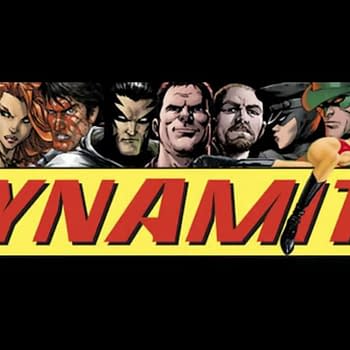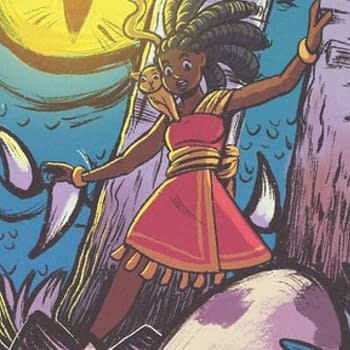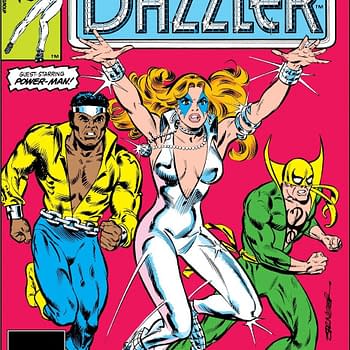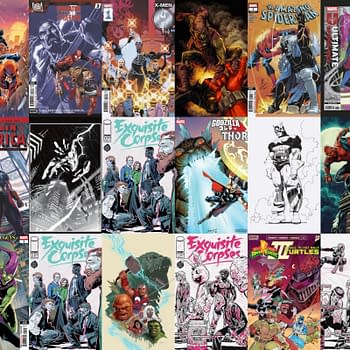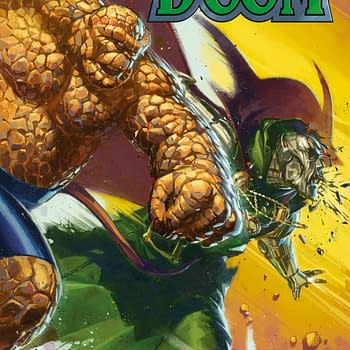Posted in: Comics, Recent Updates | Tagged: aaron sorkin, Automatic Kafka, bounce, Brad Simpson, Butcher Backer Righteous Maker, butcher baker, captain victory, catalyst comix, Comics, entertainment, frank miller, Godland, image comics, joe casey, Piotr Kowalski, Rus Wooten, sex, Sonia Harris, The West Wing, wildcats
Image Watch: Getting Into Sex With Joe Casey (Part 1)
By David Dissanayake
Joe Casey is a creator whose work I have admired for a long time. His comics are constantly inventive and always push the boundaries of the medium. His Image book Sex is a perfect example. Drawn by Piotr Kowalski, colored by Brad Simpson, lettered by Rus Wooton, and designed by Sonia Harris, Sex is a masterclass, is one of Joe's most impressive works to date. Equal parts subtle and overt, this book rubs all the right spots that a mainstream superhero book never will.
With the second Sex collection fresh off the press, I sat down with Joe for a big two-part interview to delve deeply into all things Sex. Honestly, Joe gives one of the best interviews in Comics, and doing this was damn good fun. Stay tuned next week for the second half.
David Dissanayake: So now that we're just over year into the story, I'm curious what you think about the book so far. Just your thoughts on how things have gone with it so far, both as a personal creative endeavor and as something you've actually put out on the market.
Joe Casey: So far, so good. There's nothing like slogging it out in the trenches, month after month. Creatively, I feel like it's an ongoing challenge staring me down with each and every issue… how do I push myself as a writer, how do I push myself into narrative areas that are new for me? How do we push things in other areas of monthly publishing, like graphic design? Right now, we're in the middle of a run of covers that might be some of the best that have ever graced any comicbooks I've ever written. The collections look great, too. That's mainly due to the work of our graphic designer, Sonia Harris, btw. Not to mention Brad and Rus are killing it every issue. We've got some fill-in artists coming in during the back half of this year that I'm pretty psyched about. So I guess it's just full steam ahead.
I do think I'm working so fast, just getting each issue done and out the door, that whatever personal shit I might be working out for myself through this particular material is still bubbling underneath the surface of my own tortured psyche. It seems like it might be a while before the total effect this particular work will have on me — just as a human being — will become clear. But I kinda knew that going in, so for now I'm happy to take the ride.
At the same time, the story and the characters are really cooking in a good way. A series like this is kinda like a stew… we just keep adding ingredients, stirring the pot, giving it an occasional taste and letting things continue to simmer. It's a pretty big tapestry, a lot of world building and character building. But that's the type of series it is… a dark epic of very human proportions.
DD: I wanted to get into the title Sex. While the overall story itself could be considered a "post-superhero" take that deals with notions of leaving things behind and facing up to one's self. The title certainly grabs attention, but I wanted to hear about why that was the title when the story seems to be about so much more than what the title suggests?
JC: I think sex — the notion of it, how we relate to it as human beings — has less to do with the physical act itself and everything to do with intimacy, which is a much more profound notion, completely unique to the human experience. Even when a sex act is performed specifically in order to resist intimacy, there's still intrinsic relationship between them, even in that resistance. And what Simon is dealing with, on multiple levels, is a decided lack of intimacy in his life. And it's not just Simon, a lot of the cast are looking for some sort of connection to something deeper… either within themselves or with other people.
Titling a comicbook series is a much more complex endeavor than it's ever been in the history of the medium, because a lot of the material has become more complex. Comicbook titles aren't just automatically the name of the lead character anymore. Oftentimes, you have to be a little more clever than that. But I'm also trying to get the work out there and get it noticed in an over-crowded and very competitive marketplace… and that means taking at least a few stabs at commercial viability wherever and whenever I can. Hence, a title that's pretty goddamned crass in its blatant commercialism. But, luckily, I'm just the kind of guy that knows how to harness that crassness and use it for noble purposes. It does warm my balls just a bit to know I've got the simplest, most direct title for what is absolutely one of my most complex series.
DD: I wanted to get a little into the structure of the story which seems more novelistic than some of your past work. What do you think are some of the draw backs and benefits of structuring a monthly serialized story like Sex where it's not really until the end of the 8th – or maybe even 9th issue – that the gears all begin to connect.
JC: It's a fucking tightrope to walk, no doubt about it. We live in a short attention span culture, so there's that hurdle, first and foremost, keeping readers dramatically and emotionally engaged over the long term. Then there's keeping the book itself on schedule. It gets tough to keep those balls in the air, month after month. You definitely risk burnout at every turn. But this isn't the first time I've written like this… the Wildcats stuff I did was purposefully novelistic in its structure and even GØDLAND had a bit of that mojo, too. Maybe it's how I consumed comicbooks as a kid — that "endless narrative" approach that was the hallmark of most mainstream superhero books — that still influences me now.
So playing the long game like this… it's just more fun for me personally. I like to discover things as I'm writing, I like to make certain connections in the narrative that maybe started out more subconsciously and became more obvious as I go further along. I like to dig out new areas of subtext once I've laid down a foundation. I mean, if I've got it all figured out beforehand, every last detail, why bother writing the book at all? So, to have that particular kind of fun, I have to set up a situation where those kinds of things are possible. I guess the real balancing act is to try and keep it fun for me and the readers at the same time.
DD: So how do you walk that tightrope between exploratory storytelling and keeping things on track enough to keep readers interested on an issue by issue basis?
JC: I hope I've been doing this long enough to — for the most part — trust my instincts. It's not any kind of formula, by the way. I'm feeling my way through each and every issue, which is why I think there's a lot of meat on the bone, beyond how the macro-story — such as it is — moves forward. Each single issue has been able to open up some new dimension for me, as a writer. And I have to believe that whatever enthusiasm I have for the material translates to whatever enthusiasm the readers might feel.
DD: Do you know the eventual ending planned for the series and a general time line, or is it something you want to find when it feels like the time is right?
JC: That's a good question… and I really don't have a pithy answer to whip out and slap down. The truth is, I haven't been building this series with any definitive ending in mind. But neither did Lee and Kirby when they created the Fantastic Four. Nor did Aaron Sorkin when he created The West Wing, I'd imagine. You catching my drift? You just go for as long as you're inspired, for as long as it's fun, for as long as there seems to be an audience out there for it. I certainly don't want it to end any time soon, because I feel like there's plenty of exploration left to do, plenty of dramatic avenues left to travel down, plenty of laughs to still be had. I'm still on the ride.
DD: Going back to the topic of the work's impact on you as a person, how does Sex compare to some of your other work like Automatic Kafka, Godland, or Butcher Baker and the impact they had on you? I know you said that things are still kind of bubbling under the surface and it might be a while, but I'm curious how -so far, at least – Sex compares to the other personally important works of your career and the psychological feedback you got from those?
JC: In retrospect, a lot of those other books had more to do with pure experimentation, pushing myself and my craft to new levels of creative freedom and personal expression. The content itself of those series contained its fair share of subtext, I'm sure, but I look at them mainly as deep cuts of creativity in an overall body of work. They were constructed fairly specifically so I could push the envelope as a writer within each one of them, to stretch the boundaries of my craft and hone my voice as best I could. On that level, they all worked like a motherfucker. I learned valuable lessons on those books that I was able to apply to other books that came later (to great effect, I hope). They taught me how to cut loose and really go for it. Like I said, I'm sure there were nuggets of personal, emotional resonance buried in each one of them, but I guess I've gotten to a place in my life now where I'm more open to mine more of my own psychological damage through the work itself. Even if I can't tell you exactly how it's working itself out in SEX, I know something's going on there…!
I absolutely subscribe to the notion that profound human experiences can be explored within the parameters of most literary genres, even when those parameters — on the surface — seem very limiting. And this is a genre book, to be sure. So that's what I'm going for, that kind of intense exploration… which, I hope, lines up with one of the important, overall themes of the book, which is how to find true intimacy when you have no evidence that you're equipped as a human being to do that.
DD: So in Sex, along with some of your other more recent works like Butcher Baker and Catalyst Comix, there are some thematic ties of what I guess you could call "post-superhero." It seems like you've been doing a lot of exploration into that territory in a way a lot of people haven't before. Could talk a little bit about that narrative territory and what it is about it that interests and excites you?
JC: This is a minor epiphany I've only come to recently, but I think the fact that I'm on the other side of working so heavily in the Marvel/DC factories might have something to do with it. For a good run of years there, relatively early in my career, I was primarily a Big Two writer. And, let me add, perfectly happy to be there when I was. It was a dream come true on so many levels. And let's face it, I made my professional name writing for those publishers. I had substantial runs on big franchise books, did big projects with many iconic characters, got to revisit areas of shared universe histories that meant a helluva lot to me (both as a kid and as an adult). Most of the time, it was shit-hot fun. Sex, drugs, rock n' roll and company-owned superheroes. And even now, my company — Man Of Action (plug, plug) — is coming off a pretty intense experience writing and producing just over one hundred episodes of the two biggest animated series for Marvel TV. It was all time well spent, but there is an arc to it. You do evolve and change within that experience and come out the other side a different person than you were going into it. I was practically a kid when I started writing comicbooks professionally for Marvel and DC… and if I'm not a fully-fledged adult by now, then I wouldn't know what one is.
So I certainly have a different attitude towards those Marvel/DC characters than I did before I spent those years writing them. That means, in a way, I'm personally living a "post-superhero" existence. And I would imagine that, if I were purely a dedicated reader of superhero comicbooks, over the last thirty years or so, with the same recycling of stories and trends coming around so many times, how could you not feel a little jaded by the latest "event" or the latest change in the status quo or a particular character…? I still love comicbooks, though. And I still think the concept of the superhero has a lot of literary value. So how do I write honestly about this stuff? How do I provide material that might appeal to readers who are in the same boat that I am? Well, a story about retired superhero might be a step in the right direction. I'll take further steps down this path, I'm sure, but this is a starting point for me.
I think a lot of us who work in the industry are living under those same circumstances right now. We all know the readership hasn't refreshed itself with a new generation of kids — as it had with every generation previous — since the early days of Image, I would imagine. Now, that's not a problem for me personally, because I write for myself, first and foremost. It just so happens that I know there's a fairly sizeable chunk of readers in my age demo. I mean, why are we back to endless variant covers and hyped events meant to get mainstream media attention, but that rarely translate into blockbuster retail sales (beyond the occasional spike that never, ever sustains)? Because that massive audience of kids who used to comprise our readership simply doesn't exist, so we're trying to milk the shit out of the one that does. And in doing so, we're left with a rapidly aging audience that, from what I can see, has been slowly but surely losing their patience with the things they used to depend on when they were kids and head over heels in love with superhero comicbooks. Just like I was.
Part of the underlying theme of SEX is how we process those particular feelings… and how difficult that can be for some of us. Hell, for most of us. Early on, there were readers that complained that Simon wasn't active enough, that he wasn't "doing" anything with his life after he gave up the mask and cape. To which I would respond, "Well, what are you doing with your life?" In a weird way, it's definitely putting a mirror up to what's actually happening in our "extended adolescence"-style culture.
So, that's what interests me about it. Hey, you asked…
DD: One thing that has stood out to me in Sex is the issue class in Saturn City. I'm not sure if this is a topic you're explicitly trying to deal with in the story, but there definitely seems to be a resonance with the topic, specifically when you look at Simon and Keenan. Simon being the white billionaire he is, had the luxury of being able to step away into his skyscraper, safe from the dirt and crime. On the other hand, Keenan – a young poor black male – can't walk away from the grit and danger because its an active ever present part in his life. Class is an intimate part of superheroes, and I thought it'd be interesting to hear your thoughts on that, and how they may or may not relate to Sex.
JC: I've been asked about this before. I see what you're getting at, and it's definitely an interesting aspect when you're world-building in a series like this. But, to be perfectly honest, I guess I'm more interested in the genre-specific social structure that identifies superheroes, sidekicks, super-villains, henchmen, etc. as their very own classes. And I haven't put too much thought into how those genre-specific classes might match up to a more real world class system that exits, particularly in big cities all over the world. But my own personal experience hasn't allowed me to directly confront the subject deeply enough to feel confident writing about it in such a direct way. Through metaphor and symbolism, maybe. Hopefully, I'm still doing that. But I've never cared if someone made more or less money than me, or if they somehow occupied a higher or lower social strata than me. For better or worse, I just don't pay attention to that stuff. I'm too busy making art, y'know? So I never really matched up Simon and Keenan in the way you're suggesting, aside from believing they were interesting character types that would provide for good dramatic conflict. Y'know, Iron Man and Batman are basically rich white guys, too. Frank Miller recast his Robin as a punk girl. I recast mine as a black kid.
Now, I want to bring up something tangentially related to that… something that most readers (outside of our letter column) haven't seemed to pick up on… is that Simon Cooke isn't really the main "hero" of the book. It's an ensemble story, but the real protagonist, the guy who still trying hard to do something significant with his life on that visceral level that superhero readers respond to, is Keenan. So it's weird when readers expect Simon to play out a certain role within the narrative, when it's obviously Keenan who's serving that same function in a very visceral way. Keenan's also got the most well-adjusted sex life out of all of the characters introduced so far. That, to me, is not an insignificant detail. And then there's Annabelle, who I think might be one of the strongest female characters I've ever written. Again, where Simon is often very reticent — especially with his emotions — she's usually putting it all out there. She's owning her own baggage in a very mature way.
Again, maybe it's the series' title and my performance art style of marketing it that has somehow obscured the fact that we're telling stories with some fairly progressive characters — at least in the arena of so-called "mainstream" comics. But, for me, it's probably one of the more important aspects of doing the book in the first place.
Stay tuned next week for the second installment of Bleeding Cool's massive Joe Casey Sex interview.
Sex Vol. 1 and Vol 2. are available in stores now.
You can buy Sex digitally here.
Sex #15 is in stores August 27th. Ask your retailer to pre-order you a copy using Diamond ID: JUN140497
David Dissanayake is a San Francisco Correspondent at Bleeding Cool. Give him a shout on Twitter @dwdissanayake or come say hello to him at Mission: Comics & Art in San Francisco.













